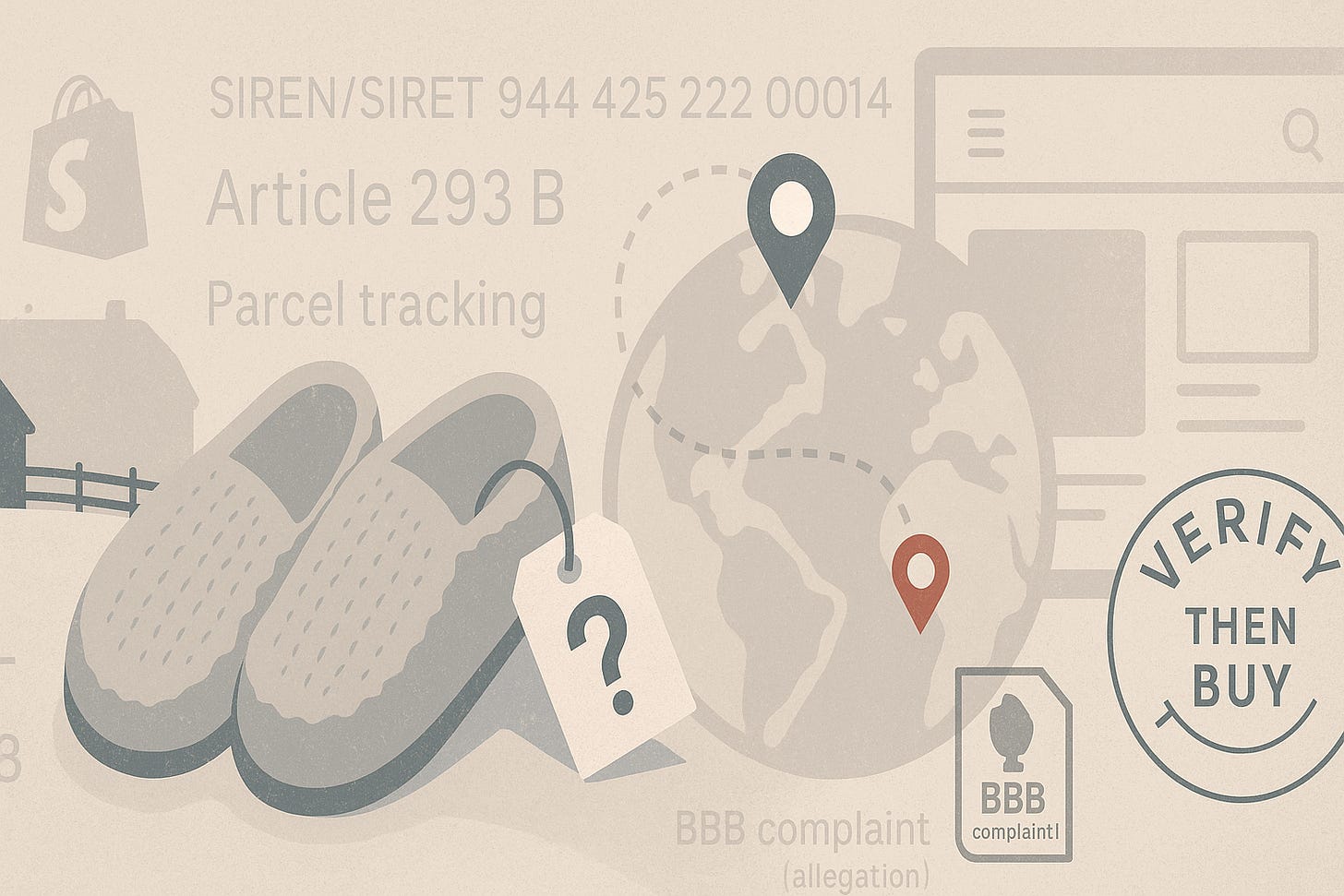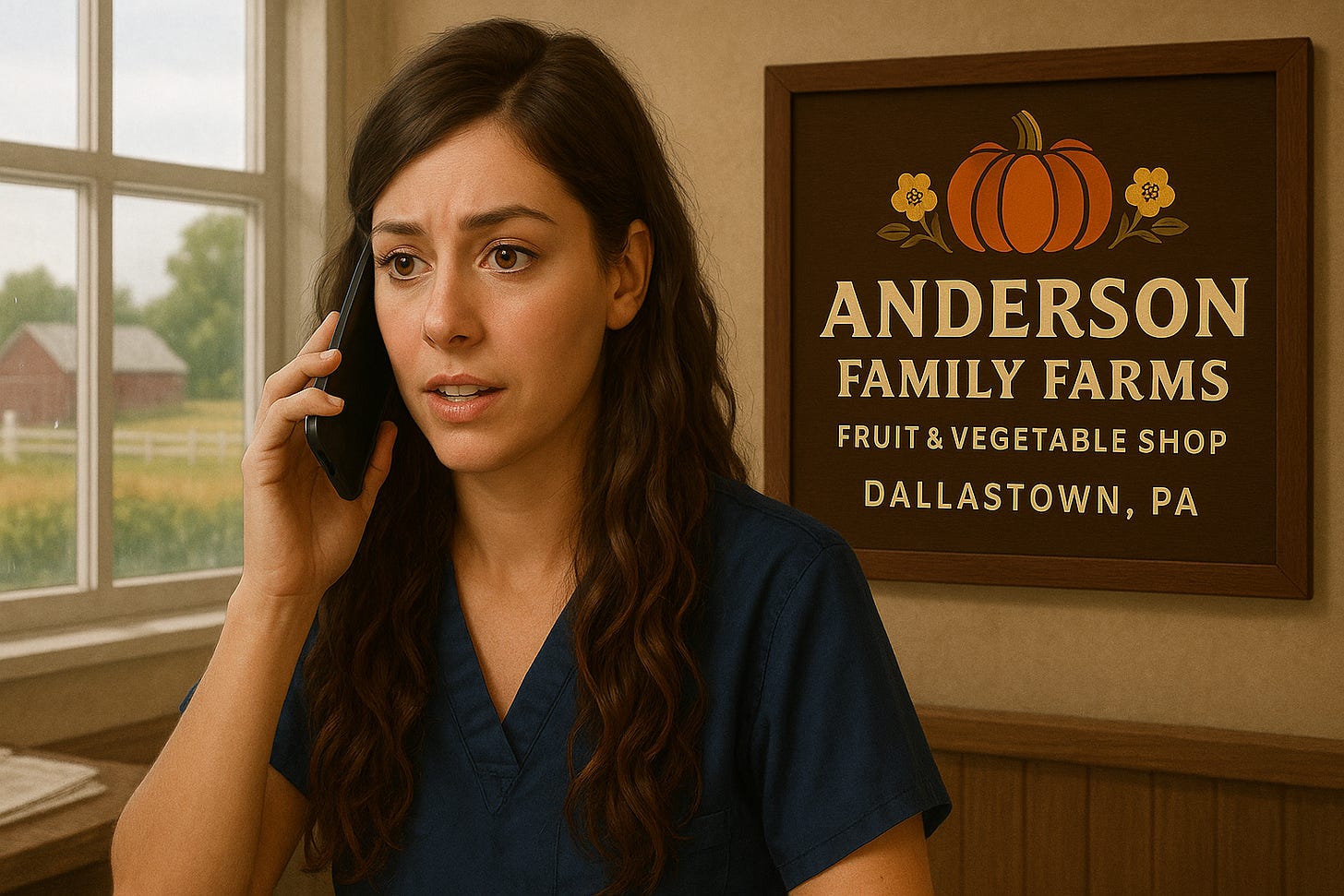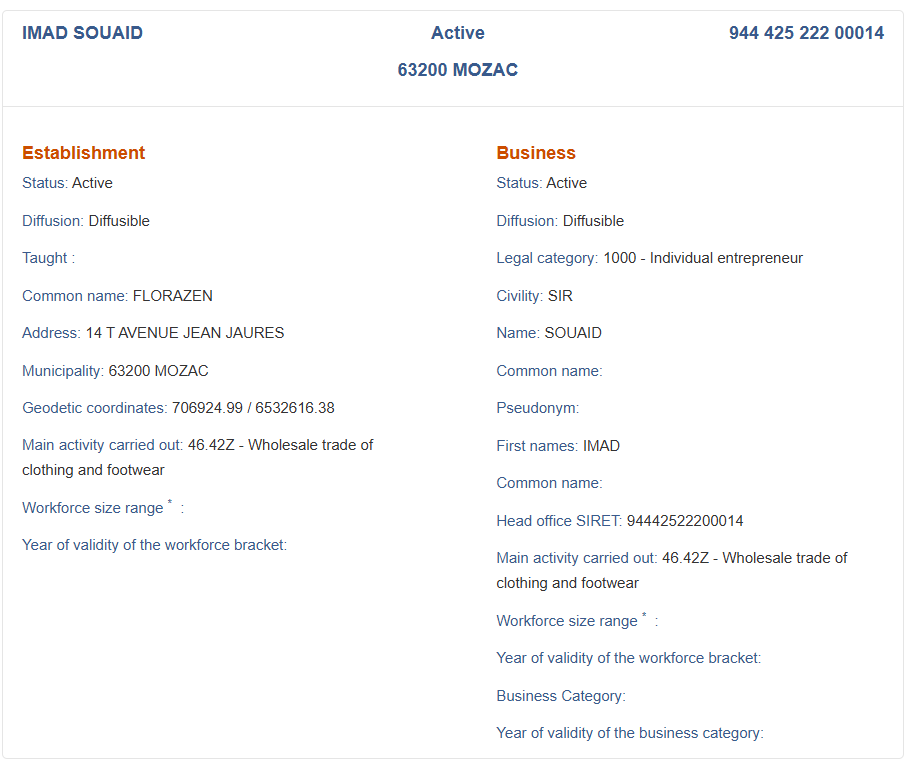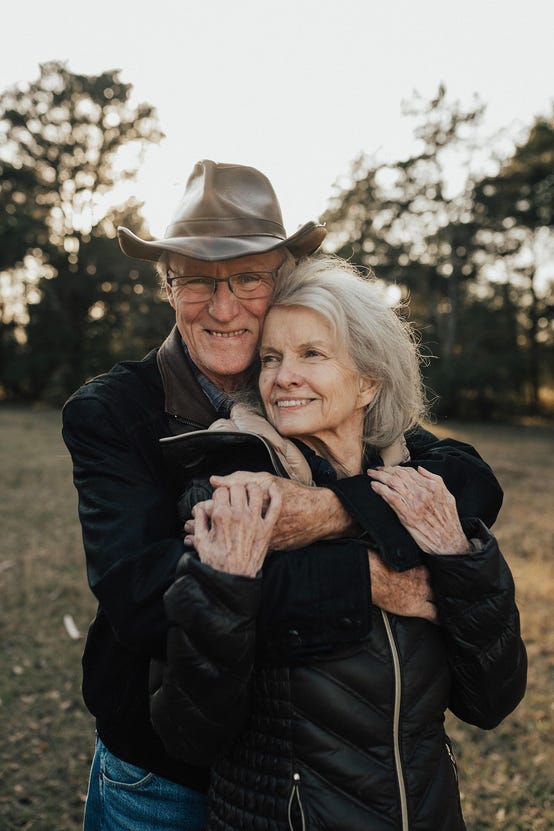Anderson Family Slippers: Pennsylvania Farm Story or Shopify Dropshipping Play?
In a viral video, the supposed granddaughter of a Pennsylvania family farm seems to claim she’s selling “family-made” wool slippers to save their farm. But, our investigation indicates otherwise…
Table of Contents
Verify Then Buy: How to Vet Viral Farm Stories—Shop Local for the Holidays
FAQ: Anderson Family Slippers, SIREN/SIRET, ParcelPanel & More
Verify Then Buy: How to Vet Viral Farm Stories—Shop Local for the Holidays
A tender Facebook video about a Pennsylvania sheep farm begged for help, selling “family-made” wool slippers and donations to “save the farm.” My wife sent it; I felt sympathy—then skepticism. This feature follows the story’s receipts from a polished Shopify storefront and engagement-bait tactics to a Legal notice naming a French sole proprietor, INSEE registry references, ParcelPanel tracking, and a BBB Scam Tracker complaint. The lesson: verify, then buy.
^Video that first brought this company to our attention.
Main Narrative: From Kitchen-Table Sympathy to Receipts
Pennsylvania Farm Claims vs. On-Site Receipts
My wife texted me the clip as she was making us lunch. Snowy fields. Lambs. A gray-haired couple in quilted coats. The captions promised a century-old Pennsylvania farm near Lancaster and a granddaughter named Emily trying to save it by selling wool slippers—claims that don’t match what I later heard from the real Anderson Family Farms in Dallastown, PA. We watched at the kitchen table—neighborly help compressed into a shareable plea. A public reply shown on the video—apparently from the business—read oddly self-defeating. Why would a brand post that under its own marketing?
The website, Anderson Family Slippers, looks serene and emotionally tuned. The homepage promises “Since 1920” and a $5,000 goal; Emily says she spent her last $300 to launch the site. Our Story leans into Pennsylvania, family heritage, and hardship. The product page lists $39.99 slippers, says they ship within the U.S., and includes a way to donate without buying. The refund policy withholds a return address until email approval.
A polished site doesn’t prove much in 2025. You can build a credible store quickly using Shopify’s free, default Dawn theme and promotions like Shopify’s free-trial/$1 offer. Quality design is cheap; “cheap” and “legitimate” aren’t opposites.
On-the-record call with Anderson Family Farms (Dallastown, PA)
I called the real Anderson Family Farms in Dallastown, Pennsylvania—not Lancaster—and spoke with Harmony by phone.
“This has been a nightmare,” she said.
“It just started happening recently this year. People keep contacting us about slippers we don’t make or sell,” which makes sense that it started recently since the supposed 105 year old farm only shows a history from this year alone. She added that the Lancaster area is known for farms and animals, which is exactly why confusion might arise—and why I double-checked whether there was any Anderson-branded farm around Lancaster that could plausibly match the viral story.
I also told her there is a BBB Scam Tracker complaint that names the slippers website and references her farm’s name; I suggested she contact BBB to clarify the record. Her account doesn’t prove intent by anyone else, but it directly contradicts the viral shop’s claim of a Pennsylvania family making wool slippers and strengthens the conclusion that the site’s Lancaster narrative on their Our Story page is untruthful in substance.
To check whether any “Anderson” farm around Lancaster might match the viral story, I looked for the closest namesake. The nearest relevant entity I found is in Conestoga, PA (Lancaster County): Building Bridges Foundation at Anderson Farm, a nonprofit offering equine therapy for veterans—not slippers. It is a recognized 501(c)(3) organization with local coverage documenting its programming in Lancaster County (Conestoga). See WGAL’s segment.
Legal Notice, SIREN/SIRET Lookup, and Article 293 B VAT
The receipts start in the footer. The Legal notice lists “Mr Souaid,” Business Registration Number: 944 425 222 00014; Company ID: 944425222; VAT not applicable—Article 293 B of the CGI—and names Shopify Inc. as host. None of this appears on the homepage with the Pennsylvania family story; it’s parked on a policy page.
In France, companies have a SIREN, a nine-digit national ID, and a SIRET, SIREN + five-digit establishment code, assigned in the Sirene registry run by INSEE. You can generate an INSEE avis de situation (“situation notice”) for a given SIRET to see the legal form, activity code, and status. INSEE also maintains plain-language explainers of Sirene identifiers and how to obtain an avis de situation.
The SIRET from the site (944 425 222 00014) corresponds to a French entrepreneur individuel (sole proprietor) named SOUAID IMAD, with NAF/APE 46.42Z: Wholesale of clothing and footwear—not agriculture.
The legal notice also invokes Article 293 B of the French Tax Code (CGI), a micro-enterprise VAT exemption that requires invoices to state “TVA non applicable, art. 293 B du CGI.” For a plain-English overview, see Stripe’s Article 293 B VAT explainer; Légifrance is the statute’s primary source.
The Terms of service, meanwhile, state U.S. governing law and confirm Shopify hosting—while the legal notice ropes in French identifiers and VAT status. That mismatch doesn’t prove anything by itself; it does raise basic questions of jurisdiction and returns.
ParcelPanel Tracking, Shopify Dropshipping, and Image Filenames
The store’s order-tracking route resolves to /apps/parcelpanel—Shopify’s standard path for the ParcelPanel tracking app. ParcelPanel is widely used by legitimate merchants, but its own documentation and marketing highlight dropshipping-friendly features, including “1-Click Hide all Chinese origin”, a dropshipping mode, and how-to guides that explicitly add /apps/parcelpanel to a store’s menu. There are even Shopify Community threads about hiding origin. Again: tools aren’t crimes; they’re clues about the stack.
Image assets offer more tea leaves—and here they’re pretty specific. One photo presented as “Emily’s grandparents” is served with a filename matching macOS’s French screenshot convention: Capture_d_ecran_2025-09-11_153711.png (literally “Capture d’écran …”). That pattern is the default when a Mac set to French takes a screen capture, which suggests the image was screen-captured and then uploaded to Shopify, rather than exported directly from an AI generator or a camera app. Generators usually output their own naming schemes unless the user renames the file; cameras typically embed model-specific EXIF metadata. Shopify’s CDN—like many CDNs—often strips or normalizes metadata on upload/serve, and many merchants remove EXIF as a matter of course, so we can’t use embedded data here to confirm camera details or provenance. The screenshot-style filename + Shopify hosting doesn’t prove where the photo came from (photographer site, stock library preview, social post, etc.), but it is consistent with an image copied from elsewhere and re-uploaded under a system screenshot name.
BBB Scam Tracker Complaint and Engagement-Bait Context
A BBB Scam Tracker complaint filed in early October 2025 alleges an Instagram pitch for a Pennsylvania farm selling slippers, names andersonfamilyslippers.com, and claims a fake tracking number from China with cards processed in France. BBB entries are allegations, not adjudications—but they’re on-record, time-stamped consumer reports and useful to compare against a site’s legal footprint.
Why these stories travel so far, so fast: Facebook announced it would demote engagement bait back in 2017. Tear-jerker montage + purchase path is the modern cousin of “LIKE if you’re an Aries”—subtler, but powered by the same mechanics.
Documented Facts vs. Working Theory
Documented
The Legal notice names “Mr Souaid,” lists SIRET 944 425 222 00014, “Company ID 944425222,” and Article 293 B VAT language; host is Shopify Inc.
The INSEE avis portal for that SIRET returns SOUAID IMAD, entrepreneur individuel, NAF 46.42Z (wholesale clothing/footwear). See Sirene explainer and how to obtain an avis for context.
The tracking page uses /apps/parcelpanel; ParcelPanel’s own docs highlight dropshipping features and the menu path /apps/parcelpanel.
The site lists no fixed public U.S. street address; the refund policy reveals returns only after approval (“exact return address (Lancaster, USA) will be provided by email”).
The Terms of service cite U.S. governing law.
The BBB complaint alleges non-delivery and France-processed payments.
On-record interview: Harmony at Anderson Family Farms (Dallastown, PA) stated by phone that the farm does not make or sell slippers and has recently been contacted by confused consumers; this contradicts the viral store’s Lancaster narrative.
Image filename evidence: A hero-style photo labeled as “Emily’s grandparents” is served with a French macOS screenshot pattern (
Capture_d_ecran_YYYY-MM-DD_HHMMSS.png), indicating a screen capture uploaded to Shopify, not an original camera export. (Observed on site; CDN may strip EXIF, so metadata isn’t conclusive.)
Working theory: the store might be operated by a French micro-enterprise (Article 293 B VAT regime) using a standard Shopify stack—not necessarily a Pennsylvania farm sewing wool from its own sheep. That doesn’t imply criminal intent; it highlights narrative mismatch between front-of-house marketing and back-of-house disclosures.
Right of Reply and Reporting Limits
Right of reply: I messaged Emily with specific questions about the family farm. No response by press time. If one arrives, it will be appended in full.
Limits: Without subpoenas or cooperation from processors/carriers/platforms, we can’t see the full flow of funds or supplier contracts. We reconcile public claims with public records and technical traces.
Receipts: Mapped Claims → Primary Sources
Pennsylvania family narrative, $5,000 goal, “$300 website”: homepage and story/infos.
Price, shipping promises, donation option: product page.
“Publisher: Mr Souaid,” SIRET 944 425 222 00014, VAT Article 293 B, Shopify host: Legal notice.
INSEE/Sirene references: avis portal, Sirene explainer, how to obtain an avis.
U.S. governing law and Shopify host: Terms of service.
Return address revealed only after approval: refund policy.
Tracking app route: /apps/parcelpanel; ParcelPanel dropshipping docs; menu-path instructions; dropshipping mode; Shopify Community note.
Engagement-bait policy (distribution context): Facebook newsroom post.
Shopify’s low-barrier setup: Dawn theme; Shopify free-trial/$1 offer.
Allegation: BBB Scam Tracker report naming the domain.
Closest “Anderson” farm near Lancaster (nonprofit): Building Bridges Foundation at Anderson Farm (equine therapy; Conestoga, PA).
501(c)(3) confirmation: Charity Navigator listing; local news coverage of equine therapy in Lancaster County: WGAL.
Reporter’s note (image filename): On-site asset shows macOS French screenshot naming (
Capture_d_ecran_…), consistent with a screen-captured upload. (Observed directly; EXIF not relied upon due to CDN optimization.)
How to Spot This Pattern (Reader’s Checklist)
Legal notice vs. landing page: If the origin story says Pennsylvania but the Legal notice points abroad (and cites VAT law there), slow down.
SIREN/SIRET lookup: Use INSEE’s avis portal; confirm legal form and NAF code. Read Sirene basics first if needed.
ParcelPanel tracking: A /apps/parcelpanel page is common on Shopify; docs and marketing show dropshipping-oriented features, including origin-hiding.
Returns transparency: Withholding a return address until approval—as in this refund policy—is a yellow flag.
Screenshot-style filenames: Names like
Capture_d_ecran_…orScreenshot_…often mean a system-level capture was re-uploaded. Not proof of fraud, but a context clue about image provenance.Boilerplate policies: Terms of service citing U.S. law alongside French VAT/registration suggests copy-paste templates.
Complaint hubs: See if a BBB Scam Tracker entry alleges a matching pattern and names the domain.
Theme polish ≠ provenance: The free Shopify Dawn theme and trial/$1 promo can make any store look handcrafted.
Kicker: Verify Then Buy, and Shop Local for the Holidays
Back at our kitchen table, my wife and I admitted the pull of stories like this—how easy it is to want to help someone on the other side of a screen, and how misdirected goodwill can spill onto unrelated local farms like the Dallastown operation I spoke with. The antidote isn’t cynicism; it’s a habit: verify, then buy. Before you spend, do two or three quick checks—map a public street address, run a SIREN/SIRET lookup or relevant registry, and ask for an invoice with a real company name/tax ID. If you truly want to help families—especially with the holidays approaching—shop local for the holidays: neighborhood farms, independent shops, co-ops, craft fairs. Online empathy is a good impulse; local spending is how it becomes dinner on someone’s table.
FAQ: Anderson Family Slippers, SIREN/SIRET, ParcelPanel & More
Q1: Is Anderson Family Slippers really a Pennsylvania family farm?
The homepage and story claim a Lancaster, PA narrative. The Legal notice lists a French publisher with SIRET 944 425 222 00014 under Article 293 B VAT, and the INSEE avis portal associates that SIRET with a French sole proprietorship in NAF 46.42Z (wholesale clothing/footwear). In addition, Harmony at Anderson Family Farms (Dallastown, PA) said the farm does not make or sell slippers and has been contacted by confused consumers.
Q2: What do SIREN and SIRET mean, and how do I check them?
They’re French business identifiers. INSEE explains Sirene/SIREN/SIRET and offers an avis de situation lookup. You’ll need the SIRET or SIREN number to query.
Q3: What is Article 293 B VAT, and why does it matter here?
Article 293 B CGI is a VAT-exemption regime for small French businesses whose invoices must state “TVA non applicable, art. 293 B du CGI.” It’s lawful—but it contrasts with a site marketing a Pennsylvania farm.
Q4: Does a ParcelPanel tracking page mean dropshipping?
Not necessarily. But the default /apps/parcelpanel route and ParcelPanel’s own dropshipping features (e.g., “hide all Chinese origin”) are typical of dropship stacks.
Q5: Why doesn’t the site list a physical return address?
The refund policy says the address will be provided by email after approval. That’s a yellow flag—legitimate small shops usually publish a return address.
Q6: What’s the closest “Anderson” farm to Lancaster that’s legitimate?
Building Bridges Foundation at Anderson Farm in Conestoga, PA runs equine therapy for veterans and is a 501(c)(3). Local coverage: WGAL.







